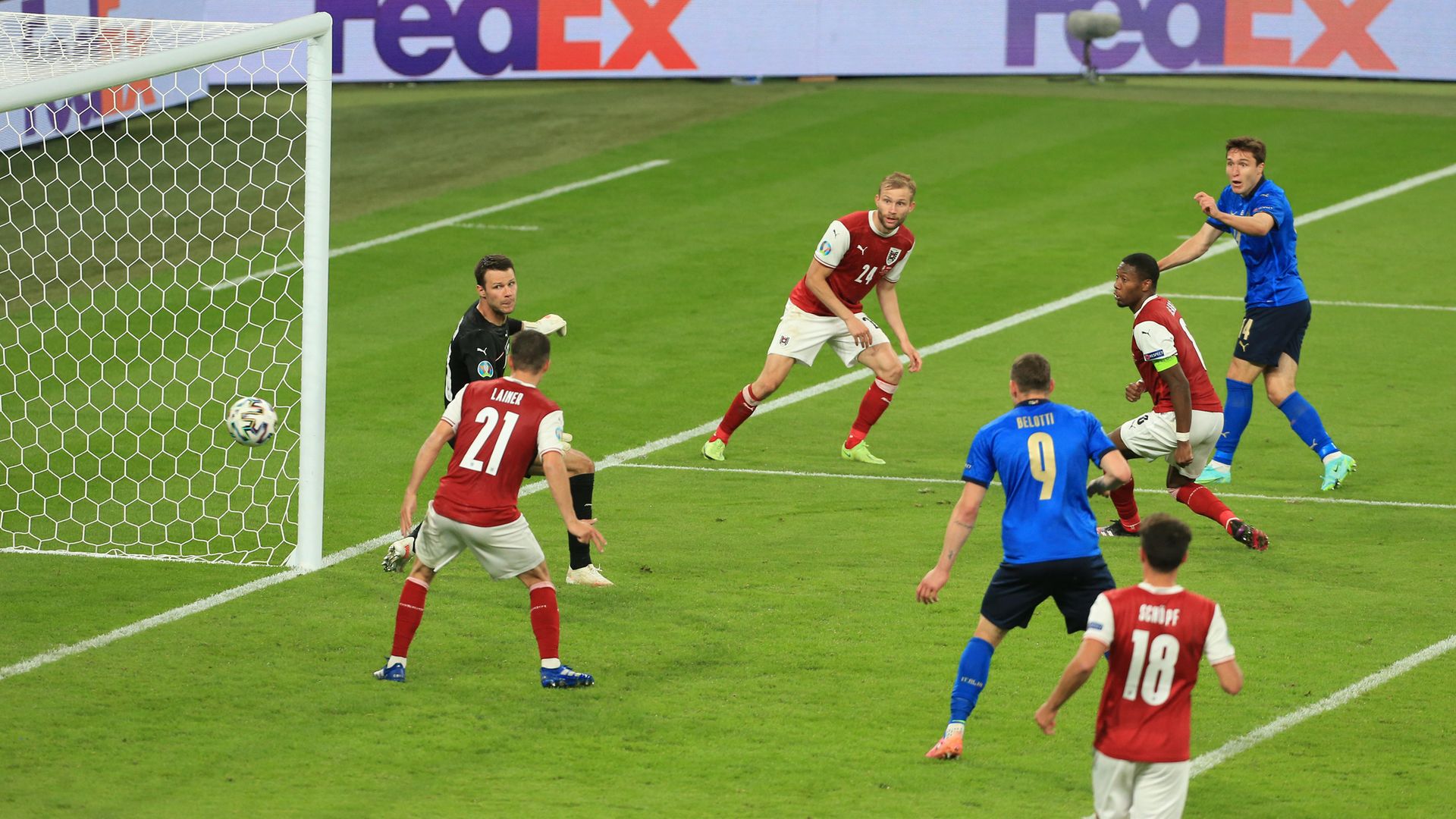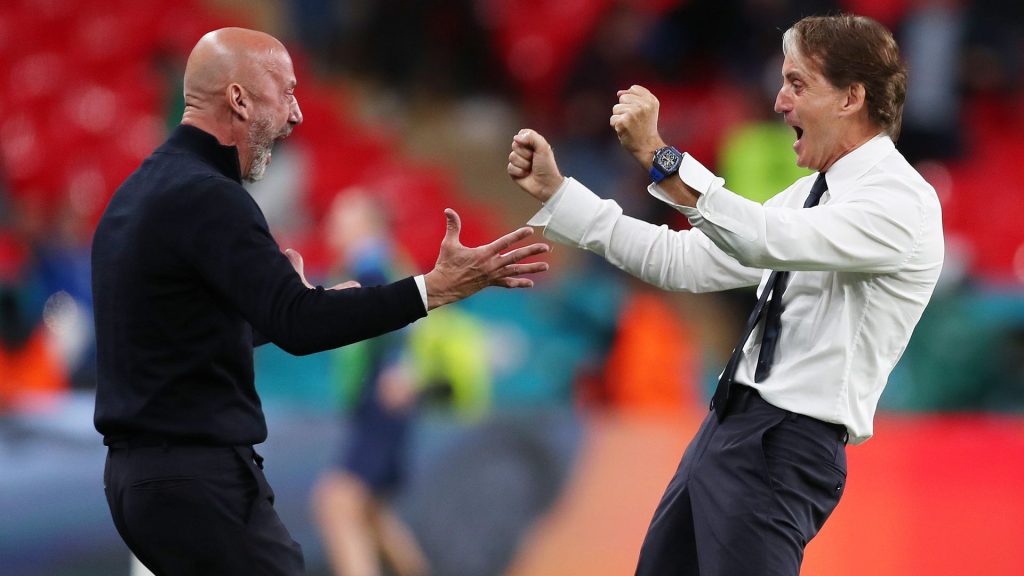
Sometimes brooding, sometimes brilliant, sometimes bludgeoning, Roberto Mancini’s remoulded Italy face a Euros date with destiny against Belgium
European football is never complete without Italy. Sometimes brooding, sometimes brilliant, sometimes bludgeoning, Roberto Mancini’s remoulded Azzurri will on Friday aim to make Roberto Martinez’s Golden Generation of Belgium suffer and perhaps be suffocated in Munich.
The Belgians at full strength are, apart from France, the quality team of this Euro. But Axel Witsel is defying medical science by playing so soon after Achilles tendon surgery in January. Eden Hazard has barely been fit for the last two years and now has another hamstring strain. And the playmaker Kevin De Bruyne was kicked off the pitch in another bruising encounter against Portugal last Sunday.
The Belgians are victims of this extraordinarily fragmented and ill-conceived tournament spread across 11 countries, and across extreme variations of climate and distance. Belgium have racked up the air miles playing in St Petersburg, in Copenhagen, back again in St Petersburg, and then against Portugal in the heat of Seville.
Italy had the home comforts of picking off much easier group opponents, all in Rome until last Saturday when they went into extra time against Austria at Wembley Stadium. This is the nature of the weird beast that, of all people, that former prince among footballers Michel Platini devised as a European celebration tournament scattered across the entire continent.
Platini couldn’t have envisaged the peril of Covid-19. But he should, after a stellar 15-year playing career in France and Italy, have known how flight and fixture congestion debilitates the sportsmen who draw the short straw of the longest distances.
Platini once lamented of his experience playing for Juventus: “One day I am king, the next a harlot”, meaning he felt praise or disparagement from one performance to the next. And those Italian mood swings have not diminished over time.
Indeed, when an Italian scored in extra time during the dour game against Austria, the explosion of emotion on the sideline reminded us just what it means to Gli Azzurri (The Blues) to eke victory out of the tortured stalemate.
The goal, from a substitute Federico Chiesa, combined movement and technique and instinct. Chiesa brought the ball down with his head, controlled it with his right foot, then shot with his left. Federico, 23, is the son of Enrico Chiesa who scored a sniper’s goal for Italy against the Czech Republic in Liverpool during the 1996 European Championship.

But Italy is a football family. The Chiesa goal at Wembley brought a former great, Gianluca Vialli, rushing from the stand to embrace Mancini in a man hug that was remarkable and reminiscent. Remarkable because Vialli, now 56, lived for three years on the edge of death after being diagnosed with advanced pancreatic cancer in 2017.
A player of athleticism and elegance, and a man of eloquence, his relationship with Mancini goes back to their time as teenagers known as I Gemelli del Gol (The Goal Twins) in Genoa. They, and Enrico Chiesa, and quite a few more in the coaching staff behind this Italian renaissance, started their careers in the Mediterranean port city by the late Paolo Mantovani, a shipping magnate who had the most remarkable eye for football talent.
“Your friend Mantovani, he knows every muscle of every player,” Gianni Agnelli, the owner of Juventus, once told me while he tried, eventually successfully, to buy Vialli from Sampdoria. Mantovani was a patrician owner who thought of Sampdoria’s English origins when signing among others Trevor Francis, David Platt and Liam Brady.
Italians, British, Dutch, Brazilians, they were all one to Mantovani. He died in 1993, but through his “sons” as he regarded the likes of Mancini and Vialli and Attilio Lombardo, we witness an Italian backroom team reapplying the lessons of togetherness and teamwork to bring Italy out of a spiral of decline.
Mancini’s squad has no great stars the way that previous generations were built around outstanding individuals like Sandro Mazzola and Gianni Rivera, or Roberto Baggio and Alessandro Del Piero, or even resplendent defenders like Fabio Cannavaro and Paolo Maldini.
Few today saw what was perhaps the greatest Azzurri team – the 1930s collection managed by Vittorio Pozzo. That side, with Giuseppe Meazza and Silvio Piola, twice won the World Cup. It went unbeaten for 30 games between 1935 and 1939.
History tells us nothing about quality or competition, or the speed of the modern game or the travails of modern competition. Pozzo’s run was under Fascist times in Italy. Yet, astoundingly, the Mancini remake has just surpassed the Pozzo record of games without defeat.
Sunday was the 31st match unbeaten under Mancini. There is no Meazza and no Piola in the line-up. There is no worthwhile comparison to be made between who the Azzurri vanquished 80 years ago and who the present team have met during the run of 26 victories and five draws.
But Mancini, more mature and more sanguine now than he was during his days as Manchester City manager, heads a 20-strong staff of tactical and technical assistants, of medical and scientific advisers, of physical préparateurs and, if required, of religious advisers that were inconceivable in Pozzo’s time.
A few things are the same. The game is between teams of 11 players (discounting the excess of five substitutes currently being used under UEFA rules) chasing one round ball (though plastic and no longer the heavy old leather ball). Italy’s foundation still starts with defence, and up to Austria’s late and futile goal in extra time last Sunday, the Mancini Azzurri remained unbreached for 1,168 minutes over 12 matches.
This despite losing their skipper, the fearsome rock of the defence Giorgio Chiellini, to a calf muscle injury. Chiellini will be missed if he is not there to confront Belgium’s Romelu Lukaku in Munich on Friday — missed not simply for his combative physicality but for all the defensive nous that the Italian captain has amassed through his 36 years and, so far, 109 caps.
That, still, is Italy. Mean in defence, industrious in midfield, able to pluck hidden depths of striking quality from the bench. Mancini is the “mister” but the Azzurri are back as a collective force in Europe.
What do you think? Have your say on this and more by emailing letters@theneweuropean.co.uk
Warning: Illegal string offset 'link_id' in /mnt/storage/stage/www/wp-includes/bookmark.php on line 357
Notice: Trying to get property 'link_id' of non-object in /mnt/storage/stage/www/wp-includes/bookmark.php on line 37







